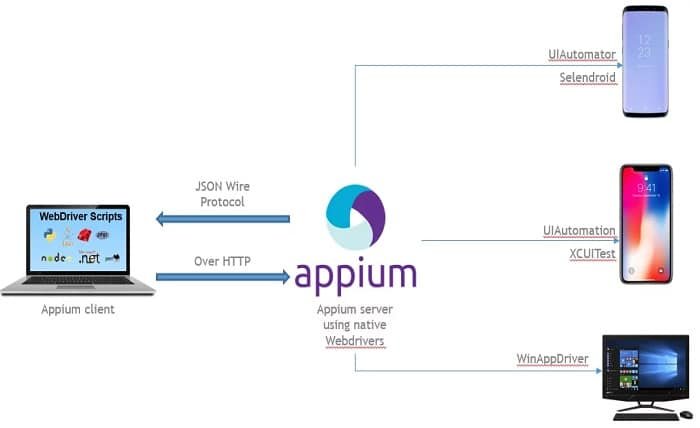In the game of mobile automation, the two most widely accepted names for tools are WebdriverIO and Appium. These two are the rulers for different developers and testers working on test creation, maintenance, and execution on multiple platforms. Now, let’s delve deep into the tools and compare them.
Understanding WebdriverIO
WebdriverIO is an end-to-end testing framework. It’s the favorite of both web and mobile applications Quality assurance professionals around the globe. Two things you can count on for webdriverIO are simplicity and efficiency.
Let us discuss a few key features
Simple Setup and Configuration
WebdriverIO is remarkably easy to set up. Its guided setup process is straightforward and user-friendly. It only takes minutes for it to be up and tested. Devised to be more accessible in its setup path, it has been crafted so you don’t have to be a genius to get going. All you need to do is follow the steps, and presto, you’re up testing at once.
Developed so that first hustles are kept at a minimum, it is accessible to just about everyone, from an absolute beginner to an advanced professional. No plodding through complex configurations, no stumbling over frustrating errors, just a smooth setup that is not supposed to be there.
Rich Plugin Ecosystem
One of WebdriverIO’s standout features is its rich plugin ecosystem. These plugins significantly extend its capabilities. Need to integrate additional functionalities? There’s likely a plugin for that. From handling different browsers to enhancing performance, WebdriverIO’s plugins make it incredibly versatile. You can tailor your testing environment to meet your specific needs without much effort. The ease of integrating these plugins means you can quickly adapt to new requirements or challenges. This flexibility makes WebdriverIO a powerhouse in the automation testing world.
Extensive Documentation and Community Support
Documentation can make or break a tool’s usability, and WebdriverIO excels in this area. There is so much documentation available for dealing with every aspect of the tool. When you are in trouble and trying to implement a new feature, then all kinds of documentation give very clear, detailed guidance.
Furthermore, the community support is fantastic. An active and helpful community means you can easily find solutions to problems. Forums, discussion groups, and online resources are at your disposal, ensuring you never feel stuck or isolated.
Built-in Support for Various Testing Frameworks
Another major strength of WebdriverIO is its flexibility. It supports most of the testing frameworks, and you can make your choice based on what will be convenient and have potential for your project. Be it Mocha, Jasmine, Cucumber—you name it, WebdriverIO has it all.
So inbuilt support means that you can harness the strengths of different frameworks without changing the tools. It should adapt to your workflow for an unbroken experience with a native feel—as if you were always meant to test this way. This adaptability is crucial for meeting diverse testing requirements, making WebdriverIO an invaluable asset for any testing strategy.
Advantages of Using WebdriverIO
Seamless Integration with WebDriver Protocol: WebdriverIO integrates smoothly with the WebDriver protocol. This ensures compatibility and ease of use.
Enhanced Performance for Web and Mobile Testing: WebdriverIO is optimized for performance. It works efficiently for both web and mobile applications.
Flexible and Scalable for Various Testing Needs: WebdriverIO is highly flexible. It can scale to meet different testing requirements. Whether you have a small project or a large one, WebdriverIO can handle it.
Exploring Appium
Appium is another popular tool for mobile automation. It stands out for its versatility and ease of use. Let’s see why many developers and testers prefer Appium.
Key Features of Appium
Open-Source and Free to Use: Appium is open-source. You can use it for free. This makes it accessible to everyone.
Supports Multiple Programming Languages: Appium is not limited to one programming language. It supports many languages. You can write your tests in the language you are comfortable with.
Compatible with Native, Hybrid, and Mobile Web Apps: Appium works with all sorts of apps—whether it’s a native app, hybrid app, or mobile web app.
Wide range of platform support on devices supported by both: Appium supports quite a wide range of platforms in devices supported by iOS and Android equally well.
Advantages of Using Appium
Strong Community and Continuous Updates: Appium has a large and active community. It gets regular updates. This ensures that it stays current and effective.
Ease of Writing and Running Tests on Real Devices: Writing tests in Appium is straightforward. Running these tests on real devices is also easy. This helps in getting accurate test results.
Flexibility with Different Mobile Environments: Appium is flexible. It works well with various mobile environments. This makes it suitable for different testing scenarios.
Comparative Analysis: WebdriverIO vs. Appium
Now, let’s compare WebdriverIO and Appium. We will look at their strengths and weaknesses in key areas.
Ease of Setup and Configuration
WebdriverIO: Setting up WebdriverIO is quick and straightforward. The guided setup process is user-friendly. You can get started without much hassle.
Appium: Setting up Appium requires more steps. However, it comes with detailed documentation. Following the guidelines, you can set it up without much trouble.
Performance and Speed
WebdriverIO: WebdriverIO is optimized for fast execution. It performs exceptionally well, especially for web testing.
Appium: Appium is slightly slower. This is because it offers broad compatibility. Despite this, it is highly reliable.
Community Support and Resources
WebdriverIO: WebdriverIO has an active community. There are many plugins and resources available. You can find help and solutions easily.
Appium: Appium also has a large user base. There are comprehensive guides and forums available. You can rely on the community for support.
Flexibility and Scalability
WebdriverIO: WebdriverIO is highly flexible. It supports many plugins and integrations. This makes it easy to extend its functionality.
Appium: Appium is scalable. It works across various devices and platforms. This makes it suitable for different testing environments.
Both WebdriverIO and Appium have their own strengths. WebdriverIO is known for its performance and simplicity. Appium is valued for its versatility and broad device support. Depending on your specific needs, you can choose the tool that best fits your requirements.
LambdaTest: Enhancing Your Mobile Automation with Real Device Testing
LambdaTest is a powerful platform that can elevate your mobile automation efforts. It provides real device testing, making your tests more accurate and reliable. Let’s see how LambdaTest fits into the WebdriverIO and Appium ecosystem.
Real Device Testing
Testing on real devices is crucial. Emulators and simulators can miss some issues. Real devices show you the actual user experience. LambdaTest offers a wide range of real devices for testing. This ensures your applications work perfectly on any device.
For example, you might develop an app that works well on emulators but crashes on certain phones. Testing on real devices catches these issues early. It saves time and resources in the long run. Real device testing is the gold standard in automation testing.
Seamless Integration with WebdriverIO and Appium
LambdaTest integrates smoothly with both WebdriverIO and Appium. This means you don’t have to change your existing setup. You can continue using the tools you are familiar with. LambdaTest extends its capabilities by providing real device testing.
Imagine running your WebdriverIO or Appium tests on various real devices without any extra configuration. LambdaTest makes this possible. It simplifies the process and enhances your testing suite’s effectiveness.
Scalable and Reliable Testing Infrastructure
Scalability is key in testing. LambdaTest offers a scalable cloud infrastructure. You can run multiple tests in parallel. This speeds up your testing cycle significantly.
Running tests one by one takes time. With LambdaTest, you can run dozens of tests at the same time. This parallel testing capability is a game-changer. It makes your testing process faster and more efficient.
Reliability is another important factor. LambdaTest’s infrastructure is robust and dependable. You can count on it to perform consistently. It ensures that your tests run smoothly every time.
Comprehensive Analytics and Reporting
Detailed analytics and reports are essential for effective testing. LambdaTest provides comprehensive insights into your test runs. You can quickly identify and resolve issues.
Analytics help you understand how your tests are performing. Reports provide a clear picture of any problems. With LambdaTest, you get both. This combination makes debugging easier and faster.
For example, if a test fails, LambdaTest’s reports show you exactly what went wrong. You can see the logs, screenshots, and even video recordings of the test. This detailed information helps you fix issues promptly.
Use Cases and Real-World Scenarios
Now, let’s look at some real-world scenarios. These examples show where WebdriverIO and Appium excel. They highlight the strengths of each tool.
WebdriverIO for Web-Centric Mobile Apps
WebdriverIO is ideal for web-centric mobile apps. These are applications that require frequent interaction with web elements. WebdriverIO handles complex web testing scenarios efficiently.
For instance, you might test a mobile web app with dynamic content. WebdriverIO’s capabilities make it easier to interact with web elements. Its rich plugin ecosystem offers tools for handling AJAX calls, waiting for elements, and more.
In another scenario, you might need to test an app across different browsers and devices. WebdriverIO’s flexibility and extensive community support help you set up cross-browser and cross-device tests seamlessly.
Appium for Comprehensive Mobile App Testing
Appium shines in testing native and hybrid apps. It supports various device configurations and operating systems. This makes it versatile and reliable.
Consider an app that needs to work on both iOS and Android. Appium allows you to write tests in one language and run them on both platforms. This saves a lot of time and effort.
Another example is testing an app’s interaction with device features. Appium supports testing of GPS, camera, and other native features. This ensures that your app works correctly in real-world conditions.
Conclusion
In summary, both WebdriverIO and Appium have unique strengths. WebdriverIO is great for web-centric mobile apps. It offers simplicity and performance. Appium is best for comprehensive mobile app testing. It is versatile and supports various devices and platforms.
Your choice depends on your specific needs. Consider your project scope and testing environment. Both tools can handle complex scenarios effectively.
Leveraging platforms like LambdaTest enhances your testing capabilities. LambdaTest provides access to real devices and a scalable infrastructure. This combination ensures accurate, reliable, and efficient testing.
By integrating LambdaTest with WebdriverIO and Appium, you get the best of both worlds. Real device testing, seamless integration, scalability, and detailed analytics make your mobile automation robust and efficient.
In conclusion, choose the tool that fits your needs. Use LambdaTest to enhance your testing process. This approach ensures your applications are reliable, efficient, and provide a great user experience.





